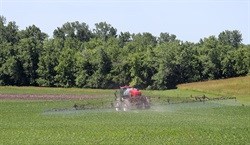
Top stories






More news

















Logistics & Transport
Uganda plans new rail link to Tanzania for mineral export boost









This was revealed by the president of the National African Farmers Union (Nafu) Motsepe Matlala after the organisation's technical committee compiled the information.
"The rain in March had a negative effect on vegetable farmers. The losses incurred amounted to R300-million in Limpopo, R100million in North West and R120million in Gauteng," he said.
"The rain was good for livestock farmers because as we head into winter there will be enough food for their cattle," he said.
Matlala said Nafu collected the information from government departments. He said this would be a difficult year for the affected farmers, and that the state should step in by increasing subsidies.
African Farmers Association of South Africa general-secretary Aggrey Mahanjana sharedMatlala's sentiments.
"In cattle farming production was not much affected. But rain always comes with other problems like diseases and increases in pests if you are an animal farmer.
"For crop farmers it was difficult to get to the crops because the fields were wet," said Mahanjana.
Matlala said the prices of agricultural produce would be affected. He warned: "The price of food is going to be affected as most of the farmers could not work on their crops and production has gone down. This means the demand of the products will be high and the prices will rise."
The National Agricultural Marketing Council (NAMC) also warned that prices of agricultural produce were going to rise.
"South Africa will experience price increases for vegetables. This will be due to the tighter supply in its vegetable sector, especially when it came the potato, tomato and onion sectors," said NAMC agro-food chains manager Christo Joubert.
"The rain has had a very positive effect on the grain sectors.
"Harvesting starts in May and there is a possibility that it can be delayed."
Joubert said they were experiencing problems with the stock levels on yellow and white maize.
"This will, and already has, have an increasing effect on maize prices for the short term.
"Therefore maize meal will become more expensive, and all the commodities from other sectors that use maize will increase.
"These include the dairy, pork, cattle and poultry industries," he said.
Source: Sowetan

For more than two decades, I-Net Bridge has been one of South Africa’s preferred electronic providers of innovative solutions, data of the highest calibre, reliable platforms and excellent supporting systems. Our products include workstations, web applications and data feeds packaged with in-depth news and powerful analytical tools empowering clients to make meaningful decisions.
We pride ourselves on our wide variety of in-house skills, encompassing multiple platforms and applications. These skills enable us to not only function as a first class facility, but also design, implement and support all our client needs at a level that confirms I-Net Bridge a leader in its field.
Go to: http://www.inet.co.za